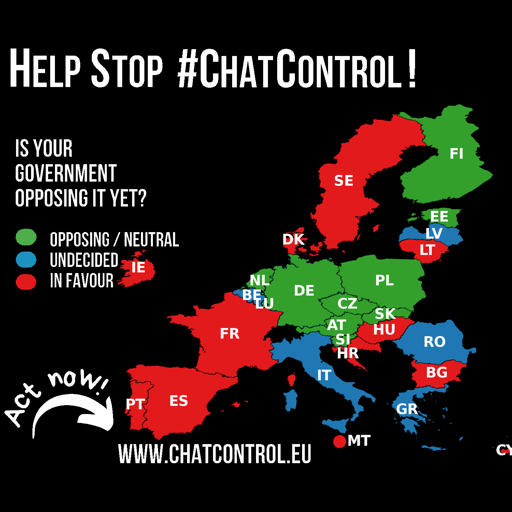- cross-posted to:
- technology@lemmy.world
- privacy@lemmy.world
- technology@lemmy.zip
- cross-posted to:
- technology@lemmy.world
- privacy@lemmy.world
- technology@lemmy.zip
…again. If it sounds familiar it’s not just you. But they’ve been back on “undecided” shortly after. Let’s hope this is the actual final decision.



AFAIK there are some EU countries with privacy laws that won’t allow chat control
I believe that the point of the Czechia situation was that it was a modification to the constitution; this will have a higher bar to change than would be the case for simply enacting an ordinary law. The idea was to entrench the status quo behind the bar for constitutional modification.
kagis
Looks like it’s a 60% supermajority in each legislative house:
https://en.wikipedia.org/wiki/Constitution_of_the_Czech_Republic#Amending_the_Constitution
So to produce such an effect, if there are laws that would prohibit bans on end-to-end encryption, say, those laws would need to be constitutional law or similar in an EU member state where such a law has a higher-than-ordinary bar to change.
Introducing: https://www.gesetze-im-internet.de/gg/art_10.html
Guarantees secret postal- and remote (original intent: radio) communications which applies to the internet ever since they thought they could make a quick buck by demanding radio broadcasting fees from youtubers, by which they placed the entire internet in the domain of radio laws.
Forget other EU countries and laws, the German constitution guarantees private postal and remote communications for every citizen. It’s also why Germany has historically never (that I know of) voted in favor of this bullshit: it violates the Briefgeheimnis (article 10 of the German constitution)
If they hadn’t rejected it the federal constitutional court in Karlsruhe would have sacked every single proposal on how to implement it, a process our current coalition is very familiar with from multiple attempts at trying to push preemptive collection of unencrypted data. They knew it wouldn’t pass here anyway and likely just waited on an opportune time to profit off the inevitable denial. Although I’ll give them that: some parts of the coalition were rather eager to meet the judges in Karlsruhe again anyway so it wasn’t a 100% guaranteed rejection either.